 First edition | |
| Author | John Buchan |
|---|---|
| Language | English |
| Genre | Adventure novel |
| Set in | Scotland |
| Publisher | Hodder & Stoughton [1] |
Publication date | 1925 [1] |
| Media type | |
| Pages | 320 [1] |
John Macnab is a 1925 adventure novel by the Scottish author John Buchan.
 First edition | |
| Author | John Buchan |
|---|---|
| Language | English |
| Genre | Adventure novel |
| Set in | Scotland |
| Publisher | Hodder & Stoughton [1] |
Publication date | 1925 [1] |
| Media type | |
| Pages | 320 [1] |
John Macnab is a 1925 adventure novel by the Scottish author John Buchan.
Three successful friends in their forties confess their ennui with their lives and professions. They are Sir Edward Leithen, lawyer, Member of Parliament and ex-Attorney General; John Palliser-Yeates, banker; and Charles, Earl of Lamancha, a Cabinet Minister. The friends are advised by a doctor that in order to recover their zest for life they should shake themselves out of their predictable lives and spend time doing something really difficult and dangerous. They decide to turn to poaching, an activity both technically challenging and also dangerous, since to be caught and publicly named would inevitably result in a career-ending scandal for such high-profile men.
Under the collective name of 'John Macnab', they set up a base in the Highland home of their young friend Sir Archie Roylance, Laird of Crask, disabled war veteran and local Conservative parliamentary candidate.
'John Macnab' writes to three of Sir Archie's neighbours informing them that he intends to kill a stag (or salmon) on their land between two specified dates. If he fails he will pay a forfeit of £100, and if he succeeds will pay £50 to charity. All three reply. Colonel Raden, head of an old-established Scottish family and owner of the Glenraden estate, recognises that the writer is some sort of sportsman, and accepts the challenge; Junius Bandicott, an American who is leasing Strathlarrig estate, confesses himself unfamilair with local customs, but also accepts; and Lord Claybody, the rich and rather vulgar lesee of Haripol Forest, replies via his attorneys threatening to prosecute anyone who trespasses on his land. The friends draw lots: Palliser-Yeates will take a stag at Glenraden, Leithen a salmon at Strathlarrig, and Lamancha a stag in the Haripol Forest.
Archie meets Janet Raden, the colonel's daughter, who puts him into a quandary by asking for his help in defeating John Macnab at Glenraden and winning the promised £100. Junius Bandicott's father, Acheson Bandicott, is an archaeologist who has been given permission to excavate a site on Glandraden that he believes to be the tomb of Harald Blacktooth. With the help of the homeless young fish seller 'Fish Benjie', Palliser-Yeates manages to shoot a stag under cover of the sound of the excavations, but is spotted by Janet before he is able to get the beast away. He escapes without being identified.
Leithen's task at Strathlarrig is complicated by the arrival of a hoard of journalists covering Bandicott's archaeological discoveries. Disguised as a tramp, he manages to take a salmon, but has to leave it on the bank to avoid being caught in possession. To throw the gillie off the scent he cuts a chunk out of the fish's flesh with a knife, and pretends that the fish was killed by an otter. Fish Benji picks it up for him, unobserved.
As the new parliamentary candidate, Archie has to give a speech at the hustings in Muirtown , but on stage finds himself too terrified even to start. Fortunately, he is saved when he recalls Janet's philosophy of life, which she had expounded to him the day before while they were walking alone in the hills. He extemporises, and makes a great, though unconventional, oration.
Lamancha's job of taking a stag in the Haripol Forest appears impossible when the journalists get wind of the John Macnab story, and crowd into the area. Claybody's son, Johnson, has also herded all the deer into the estate's sanctuary, and has surrounded it with a cordon of navvies. But with the help of a sympathetic journalist, Crossby, and a variety of feints, Lamancha succeeds in killing and extracting from the forest 'the auld hero', a famous stag.
Due to a misunderstanding, Lamancha accidentally blurts out to Claybody the identities of John Macnab. Claybody is confused, and says that he would gladly have made a game of it had he known that his adverseries were one of his own party leaders, a barrister he is instructing in a big case, and a banker with whom he has done a lot of business. No matter what they had done, Claybody says, he would never expose them.
The three friends have recovered their zest for life, and towards the end of the year Archie Roylance marries Janet Raden.
A contemporary Australian newspaper review considered the story to be "excellent and thoroughly entertaining", and from which "readers will be able to extract a good deal of genuine amusement". [2] Another Australian newspaper called it "a tale that commands attention from the opening chapter." [3]
John Prebble adapted the book for a three-part BBC television production in 1976, directed by Donald McWhinnie. [4]

John Buchan, 1st Baron Tweedsmuir was a Scottish novelist, historian, and Unionist politician who served as Governor General of Canada, the 15th since Canadian Confederation.

Waverley; or, ’Tis Sixty Years Since is a historical novel by Walter Scott (1771–1832). Scott was already famous as a poet, and chose to publish Waverley anonymously in 1814 as his first venture into prose fiction. It is often regarded as one of the first historical novels in the Western tradition.

Thomas Brown was a Scottish physician, philosopher, and poet. Renowned as a physician for his structured thinking, diagnostic skills, and prodigious memory, Brown went on to hold the Chair of Moral Philosophy at Edinburgh University from 1810 to 1820; where, "rather than pronouncing how he found things to be, [Brown] taught [his students] how to go about thinking about things."
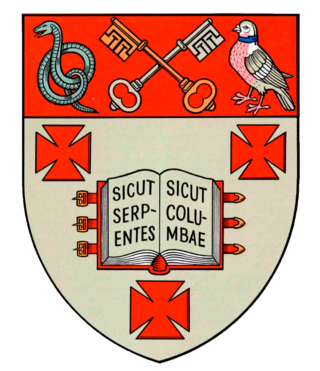
Radley College, formally St Peter's College, Radley or the College of St. Peter at Radley, is a public school near Radley, Oxfordshire, England, which was founded in 1847. The school covers 800 acres including playing fields, a golf course, a lake, and farmland. Before the counties of England were re-organised, the school was in Berkshire.

Mr Standfast is the third of five Richard Hannay novels by John Buchan, first published in 1919 by Hodder & Stoughton, London.

The Three Hostages is the fourth of five Richard Hannay novels by the Scottish author John Buchan, first published in July 1924 by Hodder & Stoughton, London.

The Island of Sheep is a 1936 novel by the Scottish author John Buchan, the last of his novels to focus on his characters Richard Hannay and Sandy Arbuthnot. It was published in the United States under the title The Man from the Norlands.
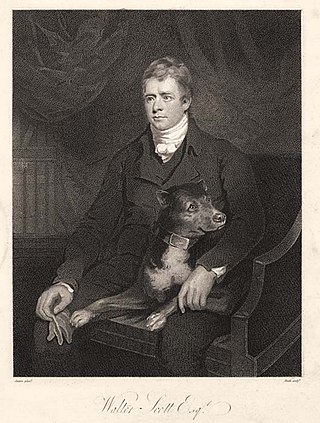
Minstrelsy of the Scottish Border is an anthology of Border ballads, together with some from north-east Scotland and a few modern literary ballads, edited by Walter Scott. It was first published by Archibald Constable in Edinburgh in 1802, but was expanded in several later editions, reaching its final state in 1830, two years before Scott's death. It includes many of the most famous Scottish ballads, such as "Sir Patrick Spens", "The Young Tamlane", "The Twa Corbies", "The Douglas Tragedy", "Clerk Saunders", "Kempion", "The Wife of Usher's Well", "The Cruel Sister", "The Dæmon Lover", and "Thomas the Rhymer". Scott enlisted the help of several collaborators, notably John Leyden, and found his ballads both by field research of his own and by consulting the manuscript collections of others. Controversially, in the editing of his texts he preferred literary quality over scholarly rigour, but Minstrelsy of the Scottish Border nevertheless attracted high praise from the first. It was influential both in Britain and on the Continent, and helped to decide the course of Scott's later career as a poet and novelist. In recent years it has been called "the most exciting collection of ballads ever to appear".
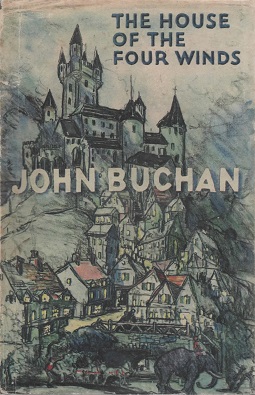
The House of the Four Winds is a 1935 adventure novel by the Scots author John Buchan. It is a Ruritanian romance, and the last of his three Dickson McCunn books. The novel is set in the fictional Central European country of Evallonia and opens two years after the events recounted in Castle Gay.
Sir Edward Leithen is a fictional character in several of John Buchan's novels: The Power-House, John Macnab, The Dancing Floor, The Gap in the Curtain and Sick Heart River. These were published over a number of years, the first in 1916, and the last in 1941, one year after Buchan's death. Leithen's name is borrowed from the Leithen Water, a tributary of the River Tweed, one of many references to the Scottish Borders in Buchan's novels.

Huntingtower is a 1922 novel by the Scottish author John Buchan, initially serialised in Popular Magazine between August and September 1921. It is the first of his three Dickson McCunn books, the action taking place in the district of Carrick in Galloway, Scotland.
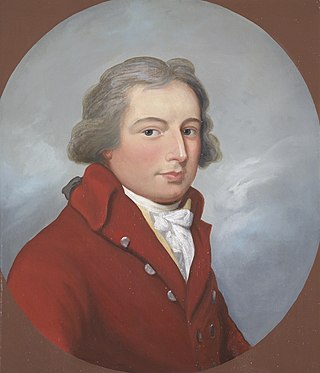
Sir Thomas Dyke Acland, 9th Baronet of Killerton in Devon and Holnicote in Somerset, was a prominent landowner and member of the West Country gentry. He was especially noted for his passion for staghunting, in which respect he took after his father. Like his father he was known locally in Devon and Somerset as "Sir Thomas his Honour".
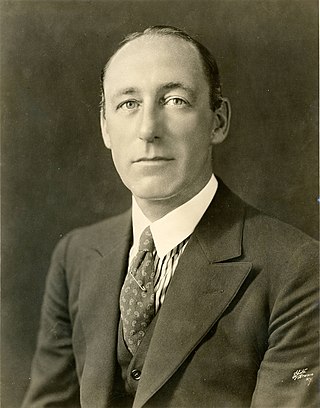
Francis Lumsden Hare was an Irish-born American film and theatre actor. He was also a theatre director and theatrical producer.

The Morgan family is an American family and banking dynasty, which became prominent in the U.S. and throughout the world in the late 19th century and early 20th century. Members of the family amassed an immense fortune over the generations, primarily through the work of Junius Spencer (J.S.) Morgan (1813–1890) and John Pierpont Morgan Sr. (1837–1913).
John Palliser-Yeates is a fictional character created by John Buchan. He appears in several Buchan novels, notably John Macnab.
Charles Lamancha is a fictional character who appears in several novels by John Buchan.
Sir Archibald Roylance was a fictional character created by John Buchan. He appeared in many Buchan novels, never as the protagonist. He was a good friend of Richard Hannay and Edward Leithen despite being younger than them.
The 1939 New Year Honours were appointments by King George VI to various orders and honours to reward and highlight good works by citizens of the United Kingdom and British Empire. They were announced on 30 December 1938.

Notwithstanding is a short story collection by British author Louis de Bernières. Published in 2009, it was inspired by Wormley, the Surrey village in which he grew up during the 1960s and 1970s.

The Runagates Club is a 1928 collection of short stories by the Scottish author John Buchan. The collection consists of twelve tales presented as reminiscences of members of The Runagates Club, a London dining society. Several of the stories are recounted by recurrent characters in Buchan’s fiction, including Richard Hannay, Sandy Arbuthnot, John Palliser-Yeates, Charles Lamancha, and Edward Leithen.